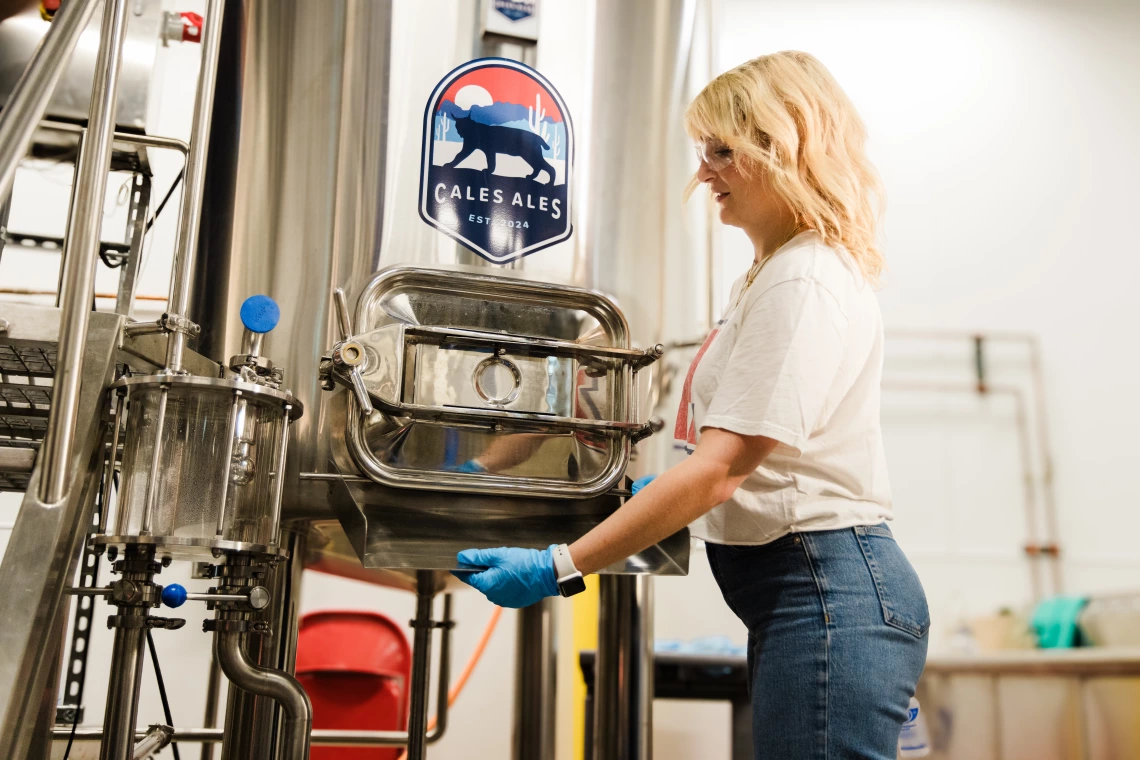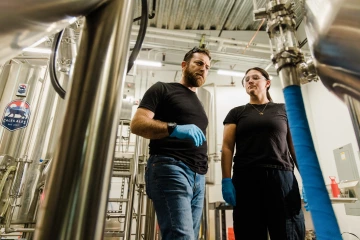Sipping on science: CALES Ales gives campus community the chance to sample the work of fermentation science students
A selection of student-produced microbrews will soon be on tap at Cork & Craft

Fermentation science students like Gracie Walters will participate in every step of the CALES Ales brewing process, from initial concept, to recipe development, to testing and quality control.
Alejandro Davalos
For fermentation science students, experiments often end with a taste test. They sample their sourdough, kimchi, kombucha and beer, and assess them for flavor, color and texture. It’s tough work, but somebody has to do it.
Now, they’ll have the chance to share some of their successes with the release of CALES Ales, a line of beers developed and produced on the main University of Arizona campus and sold at Cork & Craft. Led by Patrick Heacock, head brewer for the School of Nutritional Sciences and Wellness (SNSW), students will participate in every step of the brewing process, from initial concept, to recipe development, to testing and quality control.

Led by Patrick Heacock, head brewer for the School of Nutritional Sciences and Wellness, the CALES Ales project gives students like Riley Helder hands-on experience with industry-standard equipment.
Alejandro Davalos
“Incorporating students into the process is a huge part of our research approach in the fermentation lab,” Heacock said. “We have a pilot plant in the Forbes building where we can really experiment – explore older or obscure styles, and try out different brewing and fermentation techniques. Students will learn to make the more popular styles, but they also get a chance to play around, to fail and try again.”
Creativity and innovation are core values of the CALES Ales project, according to SNSW director Ken Wilund. “We’re confident that by using different strains of yeast, different types of grains, and some novel brewing techniques, we can develop varieties of beer with unique bioactive compounds that have some nutritional value,” he said.
Beer isn’t the only thing students are experimenting with in the fermentation lab. Tedley Pihl, an assistant professor of practice in SNSW, says students get the chance to learn from experts in foods like sourdough, hot sauce, cheese and sausage, to name a few.
“Fermented foods can be tricky to prepare consistently, so firsthand knowledge is valuable,” she explained. “Hands-on experiences are some of the best teaching tools we have – and they’re translatable to careers in the food and nutrition industries.”
Some fermentation students have already had the chance to apply their skills in a professional setting. Nine students landed internships at a dozen local breweries during the 2023-2024 academic year, and Heacock expects to place at least another four this year.
The food and beverage fermentation program has proven popular among undergraduate students and represents a renewed interest in the area of food science, historically one of SNSW’s strengths.
“We hope to build on our success with the program so far and expand our capabilities in the future to rebuild and expand our food science degree program,” said Kim Krumhar, SNSW senior scientist and a driving force behind the fermentation and food science programs. “We hope to harness the pilot plant’s capabilities to provide the campus community with innovative food and beverage products, and empower students to drive change in our food culture through research.”
